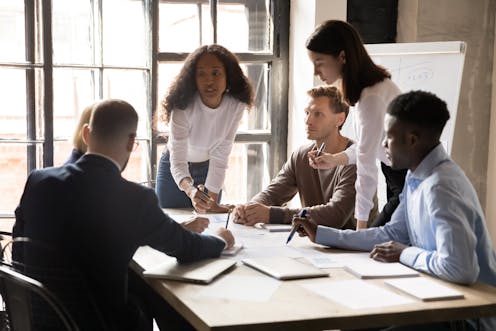With COVID restrictions easing, should Black professionals have to return to hostile workplaces?
- Written by Madi Day, Lecturer, Department of Indigenous Studies, Macquarie University

As COVID restrictions ease, many employers are encouraging staff to return to the office. While some may be looking forward to this, others are dreading going back to places where they previously experienced daily racism and microaggressions[1].
There is increasing pressure on Black professionals to return to workplaces where racist environments pose serious risks to their well-being and health.
In this article, we use the word Black[2] to refer to political identities connected to ancestry, as well as a cultural and social experience of race. Here, we use it to communicate shared recognition[3] of trauma and fear caused by racism among Aboriginal and Torres Strait Islander peoples and Black African peoples.
The shared use of the term also indicates Aboriginal and Torres Strait Islander peoples’ ongoing solidarity and connections with other Black peoples around the world.
Read more: 'Tokenised, silenced': new research reveals Indigenous public servants' experiences of racism[4]
Workplace racism and microaggressions
Examples of racial microaggressions include racialised comments on people’s appearance, speech and identity, as well as unfair scrutiny of their professional expertise and performance.
The 2020 Gari Yala (Speak the Truth)[6] survey of more than 1,000 Aboriginal and Torres Strait Islander employees found substantial experiences of racism in workplaces. Of those surveyed, 44% reported hearing racial slurs sometimes, often or always in their workplace, while 59% reported receiving comments about the way they look or “should” look as an Aboriginal or Torres Strait Islander person.
In a 2021 study[7], social work scholar Kathomi Gatwiri described Australian workplaces as “battlegrounds” for Black African professionals where both overt and covert racial microaggressions are commonplace.
Gatwiri defines[8] racial microaggressions as “everyday” or “passive” racism. These serve to invalidate the expertise of Black people while positioning white expertise as “best practice”.
Read more: If bullying can happen to Christine Holgate at the highest level, then what happens to other women at work?[9]
The myth of “merit”
The racism may not be overt at times, but it is still incredibly damaging and harmful. As race scholar Deb Bargallie demonstrates in her 2020 book[10] on racism in the public service, employers can discriminate under the guise of “merit” and “performance”. This places blame on employees experiencing racism rather than holding the organisation accountable.
Bargallie tells the story of Charles Perkins[11] who, even as a widely respected activist and a high-ranking public servant in Aboriginal Affairs, experienced systematic racism from white executives, managers and colleagues throughout his career. Describing his first six months at the Office of Aboriginal Affairs, Perkins said[12]
People set out deliberately to show me where I belonged (or should belong), and to make me feel completely an inferior person and nonentity.
The US experience
In the US, others have observed[13] a similar reluctance to return to the office among racial minorities.
In a 2021 survey by Slack’s Future Forum[14], 97% of Black participants in the US reported a preference for remote working conditions. In another Future Forum survey[15], 64% of Black respondents said they found it easier to manage stress when working from home.
Even before the pandemic, researchers argued[16] close quarters and open plan office designs in many workplaces further exacerbate existing racial tensions and inequalities.
Read more: What the "let it rip" COVID strategy has meant for Indigenous and other immune-compromised communities[17]
This is about health and safety
Australian employers have legal obligations[18] to provide their employees with safe work conditions and environments.
Given racism is endemic in many workplaces, some employers will now be asking Black professionals to return to environments that pose serious risks[19] to our mental and physical health.
Read more: Racism is a public health crisis – but Black death tolls aren't the answer[20]
In Australia, as with other predominantly white colonial nations, racism against Black peoples is a public health crisis[21]. Race-related stress contributes to significant health and life-expectancy disparities between white and Black peoples.
This is on top of the already serious public health risk of COVID, which has most severely impacted[22] Black and Indigenous communities around the world.
In Australia, state governments have been criticised[23] for rolling back health restrictions without proper consultation with vulnerable communities, even as Aboriginal and Torres Strait Islander people face an increased mortality risk[24].
If Black professionals can work from home, and feel safer when they do so, this is one measure employers can take to protect staff from the harms of racial discrimination – and an ongoing pandemic.
While working from home does not negate racism, it may offer respite from constant scrutiny and racialised commentary in the workplace, in addition to the more general work-life balance[25] benefits, such as being able to both work and care for loved ones at home.
Workplaces now have a rare opportunity to create viable anti-racist change for Black employees.
References
- ^ microaggressions (pubmed.ncbi.nlm.nih.gov)
- ^ Black (muse.jhu.edu)
- ^ shared recognition (journal.acs.org.au)
- ^ 'Tokenised, silenced': new research reveals Indigenous public servants' experiences of racism (theconversation.com)
- ^ GettyImages (www.gettyimages.com.au)
- ^ Gari Yala (Speak the Truth) (www.dca.org.au)
- ^ 2021 study (academic.oup.com)
- ^ defines (theconversation.com)
- ^ If bullying can happen to Christine Holgate at the highest level, then what happens to other women at work? (theconversation.com)
- ^ book (shop.aiatsis.gov.au)
- ^ Charles Perkins (www.sydney.edu.au)
- ^ said (aiatsis.gov.au)
- ^ observed (www.nytimes.com)
- ^ Future Forum (futureforum.com)
- ^ Future Forum survey (futureforum.com)
- ^ argued (www.tandfonline.com)
- ^ What the "let it rip" COVID strategy has meant for Indigenous and other immune-compromised communities (theconversation.com)
- ^ legal obligations (www.safework.nsw.gov.au)
- ^ serious risks (link.springer.com)
- ^ Racism is a public health crisis – but Black death tolls aren't the answer (theconversation.com)
- ^ public health crisis (theconversation.com)
- ^ most severely impacted (www.ussc.edu.au)
- ^ criticised (www.croakey.org)
- ^ mortality risk (www.thelancet.com)
- ^ work-life balance (theconversation.com)

















